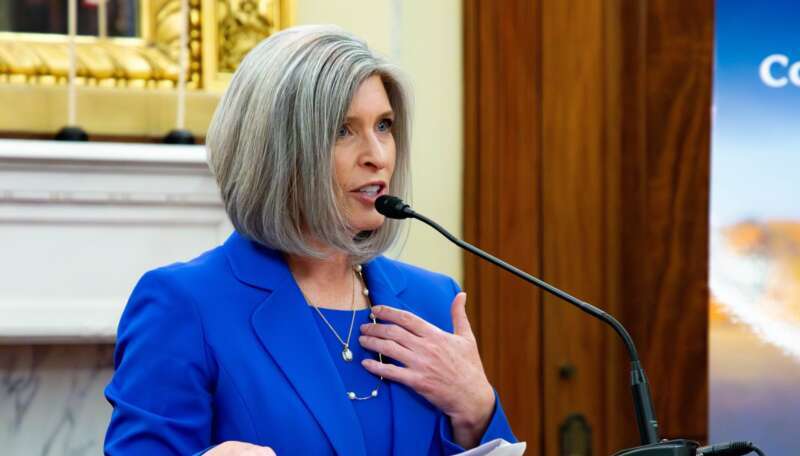
Sen. Joni Ernst, R-Iowa, released a report on Thursday focused on reforming government telework policies, relocating Federal employees away from Washington, and selling off underutilized government real estate.
Sen. Ernst shared the 60-page report with President-elect Donald Trump’s proposed Department of Government Efficiency (DOGE) advisory group, which will operate as a non-governmental commission. President-elect Trump tapped Vivek Ramaswamy and businessman Elon Musk to lead DOGE.
The senator heads the newly formed Senate DOGE Caucus, which held its first meeting on Thursday. That meeting coincided with a visit from Musk and Ramaswamy to Capitol Hill.
“For years, I have been tracking down bureaucrats relaxing in bubble baths, playing golf, getting arrested, and doing just about everything besides their job,” Sen. Ernst said in a statement.
“It would almost be funny if it wasn’t happening on the taxpayers’ dime and at the expense of veterans, seniors, small business owners, and Americans in need of competent service from government agencies,” she said. “Federal employees need to return to work, but if they don’t want to, I will make their wish come true.”
According to the senator’s report, 90 percent of Federal employees telework; up from the pre-COVID number of 3 percent. The report asserts that 6 percent of workers report in-person on a full-time basis, while nearly 33 percent of Federal employees are entirely remote.
As for Federal office buildings, the report finds that the average occupancy of agencies’ headquarters in Washington is 12 percent. It adds that “not a single headquarters of a major agency or department in the nation’s capital is even half full.”
The report points out that maintaining and leasing Federal office buildings costs more than $8 billion every year, and another $7.7 billion is spent on energy to keep the buildings running. According to Sen. Ernst’s findings, the government also owns 7,697 vacant buildings and another 2,265 that are partially empty.
Additionally, the report says that an additional $14 million is being spent leasing underutilized space and nearly $1 million more for its maintenance.
Sen. Ernst’s report details a roadmap for DOGE to cut costs, including by relocating portions of Washington’s Federal workforce. She also plans to downsize Federal real estate by implementing a “use it or lose it” approach to government buildings.
Finally, she proposes an end to “blanket teleworking” by tracking individual employee productivity and tying it to their ability to telework.
Sen. Ernst’s report conflicts with data from the White House Office of Management and Budget (OMB), which issued a report to Congress in April that finds “Federal employees returned to in-person work at rates comparable to the private sector by 2022.”
According to OMB, 54 percent of the Federal government’s 2.28 million employees work fully on-site. The remaining 46 percent of the Federal workforce is telework eligible, with only 10 percent of Federal employees – 228,000 – in fully remote positions.
However, a November report from the Government Accountability Office (GAO) reveals that Federal agencies are not consistently evaluating the impact of telework on their ability to provide services.
“Exaggerating the number of Federal employees who telework and portraying those who do as failing to show up for work is a deliberate attempt to demean the Federal workforce and justify the wholesale privatization of public-sector jobs,” the American Federation of Government Employees (AFGE), the largest Federal employee union, said in a statement. “AFGE believes that facts matter, and that lawmakers should be guided by the facts when making decisions that affect the lives of their constituents.”
